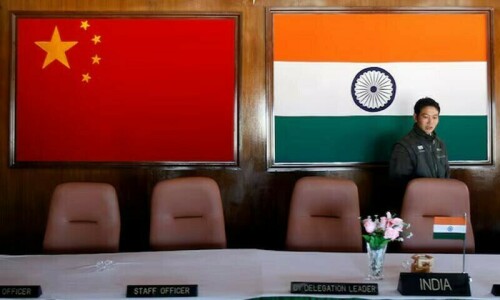
As Yubaraj Ghimire, veteran watcher of Nepal affairs, writes in a recent column, the Chief Justice-turned Prime Minister has a tough job ahead of him, with no guarantees of being able to hold a fair election or strengthen the democratic process in that country.
Nepal’s has been a tough and tortuous journey since it threw off the rule of a draconian king and brought the Maoists into what is popularly called the “mainstream” of politics. But, five years after it elected a constituent assembly to draft a new constitution, Nepal is no closer to the goal of writing a new Constitution.
Nepal’s well-wishers were hoping that with a new Constitution in place, political parties would go about the business of jockeying for power with a document to support them. Instead, the document has remained elusive, but political jockeying and squabbling continues unabated.
The “interim” prime minister between elections is a problem that Pakistan is currently dealing with as well. Conversations are going on between political parties on the choice of the interim prime minister as the country heads to the polls.
But, there’s a piece of good news from Islamabad. That the country’s National Assembly has completed a full, five-year term for the first time in the country’s history – the people now have the choice of voting out or re-electing a government for the first time. That’s a big deal.
It’s no mean achievement for a country, where the elected government has had to deal with many trials and tribulations and pro-democracy leaders have suffered at the hands of generals and their minions.
In her book, The State of Martial Rule, Ayesha Jalal wrote: “To survive and succeed, an elected Prime Minister in the Pakistani context has almost to play the role of the leader of the Opposition upholding the case of the political process against the pre-existing state structure...”
The “quality” of democracy in Pakistan is being debated and it should be, but these five years of rule by Parliament is something that can be considered a major achievement.
However, the challenges to Pakistan are mounting – the government’s inability to deal with the menace of sectarian violence and protect the lives of minority groups – are a sign of how brittle the State is.
In Bangladesh, the Shahbag movement has demonstrated that the ideal of a secular nation is alive and kicking and that people, young and old, want justice for crimes committed during the 1971 struggle for liberation.
Sri Lanka just witnessed the sacking of a chief justice because the government of the day wasn’t happy with her. The country, after the defeat of the Liberation Tigers of Tamil Eelam, hasn’t demonstrated the appetite to accommodate the interests of the Tamils and, instead, wants to undo even the minimal rights granted to the Tamil people under the 13th Constitutional Amendment.
In India, we find all the instruments of democracy intact, but find that the rule of law is unevenly imposed in a country where right-wing, Hindu communal forces are once again trying to come to power through the ballot box.
Maldives has its own share of problems, with political uncertainties remaining in that island country.
One thing in common that South Asian democracies have is the inability to deal with political rivalries. There is nothing healthy about rivalry in our democracies, our politics are often inspired by revenge and personal vengefulness.
Democracy, necessarily, has to be a work in progress. But functioning democracies would be good for the people they are expected to serve.
New engines might be good for the South Asia Express (Slow) as it is.
Let’s move ahead – one station at a time!
Amit Baruah is an independent, Delhi-based journalist. He is the author of Dateline Islamabad and reported for The Hindu newspaper from Pakistan.
The views expressed by this blogger and in the following reader comments do not necessarily reflect the views and policies of the Dawn Media Group.













































